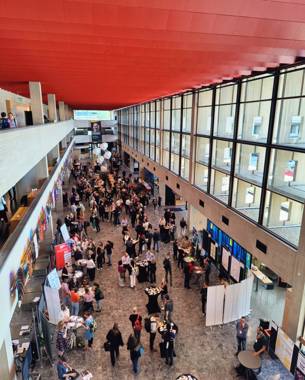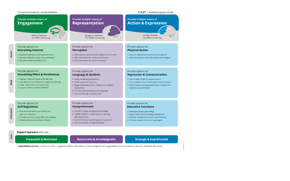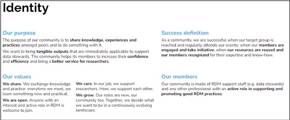Live Community Day at Hasselt University

On 15 December 2022, Hasselt University hosted a live community-building day for the FRDN Knowledge Hub at an unique venue, the “Old Prison” of Hasselt.
The day was packed with activities, including a train-the-trainer session titled "a good workshop" by Prof. Elke Emmers followed by a brainstorming session on how to translate the theory to practice in Research Data Management (RDM) workshops. The afternoon continued a series of community-building activities, this time on the topic “Identity”.
Train-the-trainer
The morning started off with a tea party hosted by Professor Elke Emmers, an expert from School of Educational Studies at Hasselt University. During the train-the-trainer session, professor Emmers shared her insights on how to organize a good workshop just like you would prepare for a tea party. Before diving into the tips and tricks, insight was given on how people learn and how to develop effective workshops according to the universal design for learning (UDL) guidelines. As we learned, the UDL guidelines provide a framework starting from how people learn and how to create an optimal learning environment for all learners by providing multiple means of engagement, representation, and action & expression (CAST, 2018).
These guidelines provide a great tool to accommodate all learners, however, the take-home message is to be authentic as an instructor and stay true to yourself. The workshop was just the cup of tea we needed delivered with humor and catching enthusiasm for teaching.

Image adopted from CAST (2018). Universal Design for Learning Guidelines version 2.2. Retrieved from http://udlguidelines.cast.org
Brainstorming
To translate the theory to practice, attendees were split into three groups to brainstorm on the implementation of the three UDL principles for workshops about various RDM topics. During this hands-on session, we wanted the attendees to think big. What was their best idea to motivate the audience with regard to RDM? Either related to one of the common RDM themes but also in general.
First, attendees had to write down their thoughts individually. Secondly, they discussed the individual ideas within their group and decided which of the ideas was the best one. Finally, at the end of the session, each group pitched their best idea ‘shark tank’ style and the other participants voted/invested for the best pitch by using customized FRDN-UHasselt money. The “Christmas shoppers” team were the devoted winners, followed by the teams “Blue-room” and “Go-Git”.
“The Christmas shoppers” pitched that online Christmas shopping can be a practical example to explain what metadata is. First, the labels describing items on a webshop (e.g., dress, toy, chair, keyboard, blue, green etc) represent a day-to-day example to explain metadata. Secondly, these labels are searchable by using the filter on the webshop, showing the functionality of being machine-actionable.
The “Blue-room” pitched the idea of using LEGO® games in RDM trainings. One of the key topics in RDM is Metadata and Documentation, which seems straightforward but in reality this is not always the case. Each team is assigned a set of LEGO® pieces, is requested to build something, and document the building proces in a certain way. Next, the builded creation are disassembled and circulated amongst the teams to rebuild it. Providing a hands-on experience why clear documentation is important and how easy it is to get lost re-using existing documentation.
Finally, the ‘Go-Git’ team shared their enthusiasm about using git and code repositories for developing research source code. The idea is to introduce attendees of a workshop to the wonders of code repositories which provide version control and history, thus documenting the changes made throughout the development of the code. Next, attendees would be shocked by experiencing a bad example of how important information is lost when one uses for example Binary files such as Excel including macro’s, which does not provide version history. Wrapping up the session with a chance to implement the ‘Go-Git’ techniques in their own project.
Furthermore, we would like to draw attention to the interesting open training materials that were mentioned throughout the session UGent Data stewards OSF, EOSC Pillar training Catalogue, FAIR teaching handbook.
Community building: Identity
The afternoon was dedicated to build on the core of the community, our identity. It involves questions of belief and influences all other parts of the community: who are we and what do we believe in?
We started the session with a recap about communities, community types and the Community Canvas process. This was followed by an interactive debate where we discussed whether we saw ourselves as a community of purpose or a community of practice. The people who preferred a community of purpose vs. those more in favor of a community of practice were asked to go to different sides of the room, provide (and write down) arguments and try to convince the other group. In the end, people who had changed their opinion could change their group/position in the room. Both groups shared some views (e.g. the community as a place where knowledge and practice is exchanged) but the “purpose” group did not see the community as limited to being a practice one, and would desire to have a higher purpose (“do something with our expertise”, e.g. lift up the Open Science environment in Flanders).
After debating and deciding the type of community, the group was divided into two break-out rooms where we brainstormed about the different aspects of the Identity of the community. We focused on purpose, members, values and success definition. Branding was not tackled in the workshop due to time constraints and because the community can make use of the FRDN branding material.
